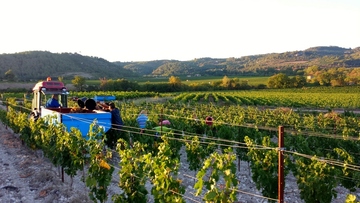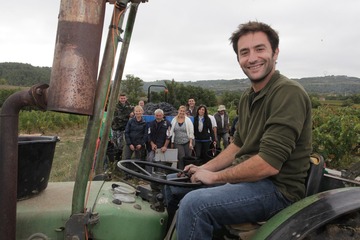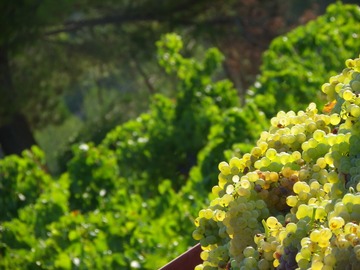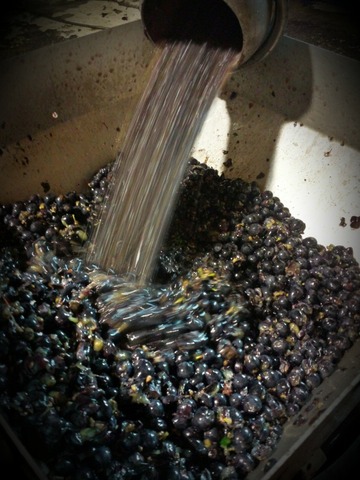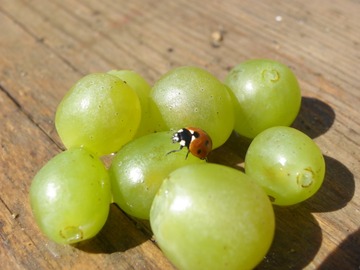Sustainable wine growing
HVE (Haute Valeur Environnementale) – (High Environmental Value) – a form of environmentally-friendly/sustainable wine growing
Growing healthy fruit using fewer plant protection products
We have created a sustainable viticulture group of 10 wine growers in our area, with the aim of preserving and protecting our terroirs. We meet every two weeks to talk, visit each other's vineyards and share our knowledge.
We are supported by the Hérault Chamber of Agriculture, and one of their representatives runs the meetings, advises us and updates us on the latest news. The strength of this group lies in its shared objectives: to become better at growing healthy grapes and to reduce the amount and frequency of vineyard treatments in order to protect the eco-system, our workers and our customers.
This year we set up a GDON (Groupement de défense contre les organismes nuisibles – a group to fight against harmful organisms) in the Cessenon sur Orb commune. The aim of this group is to reduce insecticide treatments that have become obligatory because of flavescence dorée.
Consequently there is growing interest in fighting grape worms by using sexual confusion methods (using pheromones to control reproduction) and thus reducing plant protection treatments.
Natural fertilisation of the vines
At Viranel we have abandoned chemical fertilisation in favour of amendments and organic fertiliser. We use grape pomace to make our own compost which we spread in the vineyard.
Although we add relatively small amounts of amendments compared to conventional fertilisers, we add a large quantity of organic material which aerates the soil and enhances the organic life (worms, bacteria, microscopic funghi called mycelium...)
When damp, this organic material serves as a kind of food source for the vines, as it combines with clay to create a clay and humus compound known as CAH (complexe argilo humique) rich in minerals which the roots absorb to nourish the vines.
This enables us to reduce the amount of chemical elements lost through evaporation and leaching and we don't pollute the water table and water sources, while ensuring a good nutritional balance for the vines.
For six years now we have been experimenting with different formulations which allow us to multiply the amount of bacteria in the soil, increasing the quantity of humus while enhancing organic life.
This means we can make top quality wines for clients with whom we have worked for many years, like:
-CAVES NOTRE DAME à Montpellier (34000)
-LA FILLE DU TONNELIER à Carqeufou (44470)
-LES VINS PIRARD en Belgique
-BANCROFT WINES en Angleterre
-LES SOMMELIERS CAVISTES à Vitré (35500)
-CELLIER DES DOCKS à Biarritz (64200)
-CAVES PIERRE NOBLE à Rouen (76000)
-LE MARCHE AUX VINS à La Roche/Yon (85000)
-AIROLDI FAMILY FINE WINES en Australie
- etc.....
Enhancing the soil at Domaine Viranel
In order to maintain the life in our soil and protect it from erosion, we no longer plough in winter. This means that in autumn, cover crops grow spontaneously. These are ploughed back into the soil in spring, acting as a green fertiliser (soil life, organic material, nitrogen...)
This also means we protect the soil from erosion, avoiding its compaction thanks to the action of the weeds' roots and smaller root systems, and increasing their resistance to tractor usage. It goes without saying that grass-covered soil is a much richer biotope that bare soil.
The rows between the vines are worked mechanically using an intercep instead of weedkiller to prevent self-propagating plants from growing around the vines.
Eco-friendly wine production
Looking after the Saint-Chinian terroir
It is well known that monoculture is the enemy of nature, encouraging the proliferation of parasites and pests by reducing the biodiversity of flora and fauna to a minimum. This is why we are committed to the upkeep of the hedgerows, streams, grass strips, small wooded areas and garrigue scrubland which contribute to the beauty and diversity of our countryside, and which are home to many different species.
Why use natural cork?
For five years we sealed our white and rosé wines with synthetic cork, but we've now gone back to using natural cork for all our wines. It may seem like a very small gesture but synthetic materials are becoming increasingly prevalent, and cork forests capture more than 20 million tons of carbon each year.
Using natural cork is one way of respecting the concept of durability (Triple Bottom Line: business development, social development and environmental development), as well as it being an eco-friendly product.
Our suppliers
We are careful to choose suppliers from our local area, to promote local businesses and reduce our carbon footprint in terms of transport.
To find out more about our sustainable viticulture practices, use the online contact form.

